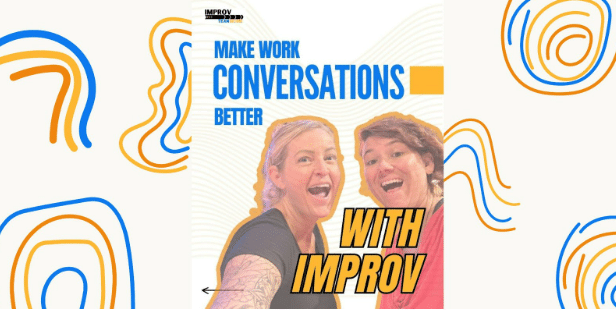Leading a conversation, whether in a professional or social setting, presents its challenges. Don’t worry! We can borrow a technique from improv comedy to inject more flexibility and dynamism into our discussions.
Yes, you heard correctly! Improv isn’t exclusive to comedy clubs or theater enthusiasts. It holds valuable insights for smoothing out those rough edges in work conversations.
One invaluable nugget from the realm of improv? The renowned “Yes, And” mindset.
Believe me, it’s a game-changer.
The “Yes, And” Mindset
A fundamental principle of improv is the concept of “yes, and…”.
In this approach, participants accept whatever their conversation partner presents (“yes”) and then expand upon it (“and”). This fosters active listening, collaboration, and trust-building, vital elements in effective workplace communication.
In professional settings, embracing a “yes, and…” mindset can revolutionize interactions among colleagues. Instead of dismissing ideas or immediately critiquing, employees learn to acknowledge and build upon each other’s contributions.
This cultivates an environment of openness, where individuals feel empowered to share ideas without fear of judgment. Consequently, teams become more innovative and adaptable, exploring new avenues and solutions collaboratively.
The Power of Listening
Improv also sharpens crucial communication skills like active listening, empathy, and adaptability.
Performers must attentively listen to their scene partners in order to respond authentically and enrich the scene. This practice directly translates to the workplace, where effective communication hinges on active and empathetic listening.
Additionally, improv encourages clear and concise communication. Performers must convey their ideas clearly and succinctly to ensure mutual understanding and collaboration. This emphasis on clarity aids professionals in effectively communicating in meetings, presentations, and daily interactions, fostering greater comprehension and alignment among team members.
Being Present in the Moment
Presence in the moment is paramount in improvisation. Performers must fully concentrate on their scene partners and the unfolding narrative, enabling authentic and spontaneous responses. This mindfulness practice holds equal significance in the workplace, where distractions and competing priorities can impede effective communication.
By cultivating present-moment awareness, employees can engage more deeply in conversations, meetings, and collaborative endeavors.
This enhances their ability to listen and respond effectively, fostering deeper connections and understanding among team members.
Whether brainstorming ideas, providing feedback, or resolving conflicts, being present in the moment enables individuals to participate fully, communicate more authentically and meaningfully with colleagues.
Embrace Discomfort for Growth
Improv often thrusts performers into uncomfortable or unfamiliar territory, whether portraying unfamiliar characters or navigating unexpected plot twists. Rather than shying away, improvisers embrace discomfort as an avenue for growth and exploration.
This willingness to step outside comfort zones is a valuable skill in the workplace.
By embracing discomfort, employees can surpass perceived limitations and uncover new strengths and capabilities. Whether delivering presentations, leading projects, or engaging in difficult conversations, stepping outside comfort zones allows individuals to evolve professionally.
Moreover, by fostering a culture that values risk-taking and experimentation, organizations can stimulate innovation and creativity among teams.
Implementing Improv Conversations in the Workplace
Incorporating improv conversations into the workplace doesn’t necessitate hiring actors or extensive training. Simple exercises can be integrated into team meetings, training sessions, and everyday interactions to harness the benefits of improv principles.
For instance, teams can kick off meetings with a brief warm-up exercise like “Yes, and…” brainstorming, where each member contributes ideas without judgment. This sets a positive and collaborative tone while encouraging creativity.
Another effective exercise is the “storytelling circle,” where team members contribute one sentence at a time to create a story collaboratively.
This fosters active listening, collaboration, and creativity, fostering camaraderie among team members.
Leaders can also incorporate improv techniques into feedback sessions and performance reviews to encourage constructive dialogue and growth-oriented feedback.
By nurturing a safe and supportive environment for feedback, leaders facilitate the development of communication skills and trust within the team.
Give It A Try!
In today’s demanding workplace, effective communication is paramount.
By embracing improv principles, organizations can cultivate collaboration, creativity, and adaptability among employees, leading to increased innovation, productivity, and resilience.
From building trust and collaboration to enhancing communication skills and managing conflict, improv conversations offer a potent toolkit for improving work dynamics.
Why not give it a try? Embrace the possibilities of improv in the workplace with a resounding “yes, and…”, and witness your team flourish in unexpected ways.

